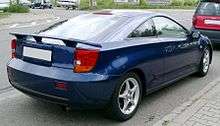Fastback
A fastback is an automotive styling feature which is defined by the rear of the car having a single slope from the roof to the rear bumper.[2][3][4]


Some models (such as the Ford Mustang) have been specifically marketed as a fastback, often to differentiate the model from other body styles (e.g. coupe models) in the same model range.
Definition

A fastback is often defined as having a single slope from the roof to the rear of the vehicle.[5]
More specifically, Road & Track have defined the fastback as "A closed body style, usually a coupe but sometimes a sedan, with a roof sloped gradually in an unbroken line from the windshield to the rear edge of the car. A fastback naturally lends itself to a hatchback configuration and many have it, but not all hatchbacks are fastbacks and vice versa."[6]
In the case of the Ford Mustang, the term fastback is used to differentiate against the coupé body style,[7][8] which has a steeper rear window, followed by a horizontal bootlid.
History
.jpg)
Automobile designers in the 1930s began using elements of aircraft aerodynamics to smooth out the boxy-looking vehicles of their day.[9] Some designs that were ahead of their time when exhibited during the early 1930s included "teardrop" streamlining of the car's rear; a configuration similar to what would become known as "fastback" 25 years later."[10] Merriam-Webster first recognized the term "Fastback" in 1954, many years before the popularization of the term "hatchback", which entered the dictionary in 1970.[11] Opinions vary as to whether the terms are mutually exclusive.
Early examples of fastback cars include the 1929 Auburn Cabin Speedster, 1933 Cadillac V-16 Aerodynamic Coupe, 1935 Stout Scarab,[12] the 1933 Packard 1106 Twelve Aero Sport Coupe,[13] Bugatti Type 57 Atlantic, Tatra T87, Porsche 356, Saab 92/96, Standard Vanguard, GAZ-M20 Pobeda, and Bentley Continental R-Type.
In North America the numerous marketing terms for the fastback body-style included "aerosedan" and "torpedo back".[14] Cars included Cadillac's Series 61 and 62 Club Coupes, as well as various other models from General Motors, Ford, and Chrysler. By the early 1940s nearly every domestic manufacturer offered at least one fastback body-style within their model lineups.
In Australia fastback cars became known as the "sloper" and began to be introduced in 1935 - first designed by General Motors' Holden as one of the available bodies on Oldsmobile, Chevrolet, and Pontiac chassis. The sloper design was added by Richards Body Builders in Australia to Dodge and Plymouth models in 1937, by Ford Australia in 1939 and 1940, as well as a sloper style made on Nash chassis.[15] According to automotive historian G.N. Georgano, "the Slopers were advanced cars for their day".[16]
Aerodynamic advantages
Fastbacks provide an advantage in developing aerodynamic vehicles with a low drag coefficient.[17] For example, although lacking a wind tunnel, Hudson designed its post-World War II cars to look aerodynamic and "tests conducted by Nash later found that the Hudson had almost 20% less drag than contemporary notchback sedans".[18]
List of fastback cars
| Wikimedia Commons has media related to Fastbacks. |
References
- McCourt, Mark J. (July 2013). "1967 AMC Marlin". Hemmings Motor News. Retrieved 1 March 2016.
- Flammang, James M. (1990). Standard Catalog of American Cars, 1976-1986. Krause Publications. p. viii. ISBN 9780873411332. Retrieved 1 March 2016.
- "fastback". Merriam-Webster Online Dictionary. Retrieved 1 March 2016.
- "fastback". The Oxford Pocket Dictionary of Current English. Retrieved 1 March 2016.
- "fastback". Random House Kernerman Webster’s College Dictionary. 2010. Retrieved 1 March 2016.
- Dinkel, John (2000). Road & Track Illustrated Automotive Dictionary. Bentley. ISBN 0-8376-0143-6.
- "1965 Ford Mustang Fastback Guide". www.autotrader.com. Retrieved 17 April 2018.
- "1967 Mustang Specifications". www.mustangspecs.com. Retrieved 17 April 2018.
- Walker, Clinton (2009). Golden Miles: Sex, Speed and the Australian Muscle Car. Wakefield Press. p. 16. ISBN 9781862548541. Retrieved 24 December 2015.
- Georgano, Nick N., ed. (2000). The Beaulieu encyclopedia of the automobile. Fitzroy Dearborn Publishers. p. 960. ISBN 978-1-57958-293-7. Retrieved 11 June 2012.
- "hatchback". Merriam-Webster Online Dictionary. Retrieved 24 December 2015.
- Clements, Rob. "EyesOn Design 2007 Report". Ultimatecarpage.com. Retrieved 24 December 2015.
- Adler, Dennis (2004). Packard. MotorBooks/MBI. p. 960. ISBN 978-0-7603-1928-4. Retrieved 24 December 2015.
- "The Forty-Niners". Time. 24 January 1949. Retrieved 24 December 2015.
- "The Sloper Page". Hand Publishing. Archived from the original on 4 March 2016. Retrieved 24 December 2015.
- Walker, p. 18.
- Noffsinger, Ken R. (June 2012). "The G-Series Wind Tunnel Test Report". Retrieved 24 December 2015.
- Severson, Aaron (6 September 2009). "Step-Down: The 1948-1954 Hudsons". Ate Up With Motor. Retrieved 24 December 2015.